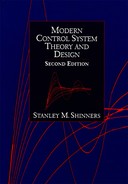1.1. INTRODUCTION
The desire of people to control nature’s forces successfully has been the catalyst for progress throughout history. Our goal has been to control these forces in order to help perform physical tasks which were beyond our own capabilities. During the dynamic and highly motivated 20th century, the control-system engineer has transformed many of our hopes and dreams into reality.
Control-system engineers have made very important contributions to our advancements in the 20th century, and they are building the foundation for greater advancements as we approach the 21st century. As we look back, control-system engineers have made contributions to robotics; space-vehicle systems, including the successful accomplishment of the lunar soft landing; aircraft autopilots and controls; control systems for ships and submarines; guidance systems for intercontinental missiles; and automatic control systems for hydrofoils, surface-effect ships, high-speed rail systems; and, most recently, control systems for the magnetic-levitation rail systems. The future lies in our imagination, creativity, and ability to transform ideas into working automatic control systems that we can build to work reliably and accurately, and which can be manufactured at a profit and on schedule. It is hoped that this book contributes to the attainments of our future goals and dreams in the advancement of automatic control systems.
The control of systems is an interdisciplinary subject and cuts across all specialized engineering fields. This book recognizes this fact and presents illustrations of control systems from the fields of electrical, mechanical, aeronautical, chemical, nuclear, economics, management, bioengineering, and other related fields. The versatile subject of automatic control ranks today as one of the most promising fields, and its growth potential appears unlimited.
Control systems can be defined as devices which regulate the flow of energy, matter, or other resources. Their arrangement, complexity, and appearance vary with their purpose and function. In general, control systems can be categorized as being either open loop or closed loop. The distinguishing feature between these two types of control systems is the use of feedback comparison for closed-loop operation.
Properties characteristic of open-loop and closed-loop control systems are discussed in this chapter. We shall give several examples of each type so that the reader may gain a thorough understanding and a good foundation for further studies in this book. Included will be a qualitative, philosophical comparison between the behavior of closed-loop control systems and that of living creatures. The feedback concept can also be applied to model our economic system. A discussion of modern control-system applications will conclude the presentation of this chapter.
